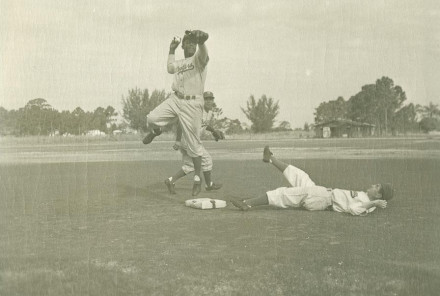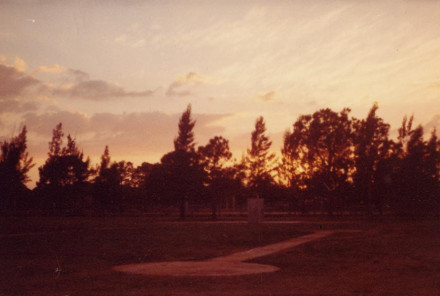Dodgertown Memories
Bill DeLury
- Dodger Executive
- 1950–2015

Jackie Robinson makes the pivot at second base to practice a double play during Spring Training activities at Dodgertown, Vero Beach, Florida. He took the ball from shortstop Pee Wee Reese behind him as the runner is sliding in to the bag and prepares to throw to first base.
Photo by Barney Stein

It’s sunset time at Dodgertown, Vero Beach, Florida on the rundown field next to Field #3.
Starting with the Dodgers as a 17-year-old office boy, Bill DeLury built a reputation as one of baseball’s most respected executives. DeLury was hired by the Brooklyn Dodgers to distribute mail in 1950 and worked his way up the ladder, serving in the Dodger ticket office and later became the club’s traveling secretary for more than 20 years. Dedicated DeLury negotiated hotel, airplane and ground transportation agreements and provided outstanding service to Dodger players and traveling personnel. He first went to Spring Training at Dodgertown in 1951, when he ran the mailroom and handled player and staff dry cleaning with Vero Beach Laundry. DeLury continued until his military obligation took him away for the 1957-58 seasons. He returned in the spring of 1959 and sold advertising for the Dodgertown program, as well as season tickets in downtown Vero at Rexall Drugs, Vero Beach Cadillac and Vero Beach Laundry. He joined Dodger Vice President Fresco Thompson in the minor league department after that until 1966, when he became assistant ticket manager in the Dodger ticket office until 1978. From 1979-2008, DeLury was at Dodgertown each spring. Perhaps, nothing was more rewarding to him than on St. Patrick’s Day 1996 when he was presented with a key to Dodgertown from Dodger President Peter O’Malley. He once said, “If you don’t like Dodgertown, you don’t like peanut butter. It’s un-American.”
Thinking of Dodgertown, what comes to my mind it’s like a city within a city. The Brooklyn Dodgers and Los Angeles Dodgers trained there for 60 years. The one thing that makes Dodgertown so unique over any other place is the continuity of the people, the players, the staff, the minor league players all live together.
“They all share the same dining room and living quarters together. There is continuity in sitting around at night talking baseball, talking about the past seasons that they went through. I think that brings an organization like the Dodgers a little closer together than other organizations. I don’t know that for a fact, because I have never been in any other organization, but players that come from other organizations that I sit down and talk to, they all have the same thing to say about the Dodgers. ‘This is my fourth organization and I’ve never seen anything like this,’ they’ll say. One year, I guess it was in 1980 against the St. Louis Cardinals and Jerry Reuss, who was with Houston and the Cardinals for a number of years, was on our club that year. When it was time to leave (for a game), we headed over to the airport in Vero Beach, it was only about eight-tenths of a mile from our complex and we all boarded the plane to fly over to St. Petersburg, which was only about 150 miles west of Vero and he said to me, ‘Are we flying over there?’ And I said, yes we are. He said, ‘I don’t believe this. I have never been on a club that flew in Spring Training. Everything was by bus.’ I said we’ll have a bus meet us at the airport in St. Pete and take us to the stadium and take us back to the airport and we’ll fly back to Vero. That whole trip, he was amazed with his mouth open. He couldn’t believe what was happening. He had never witnessed anything like this before. That’s the things I think about Dodgertown.
“Years ago, after dinner, we had what looked like a huge hotel lobby and it had a canteen in it for soda pop and ice cream. It had a pool table and players would go in there and play pool and ping pong. It had a juke box. That’s all they had. There were no TVs in the rooms. There was no heat in the rooms. You stayed in this huge lobby with 300, 400 or 500 people. You told stories and it was very interesting. Nowadays, after a player has dinner at night, he goes back to his room, he has got a color TV, so the continuity of the players coming together, you don’t see that anymore today. Years ago when we traveled by train, there was much better continuity than there is today. I listened to stories from Roy Campanella, (Don) Drysdale, Carl Furillo, Duke Snider; you can go on and on. You don’t forget the guys in the 1950s because those are names that are buried in you, because they go back so many years and they meant so much. Every opening day, you could just about tell what the starting lineup was going to be in January – you knew Campy was going to be there, you knew Gil was going to be there…Jackie and Pee Wee and Billy Cox and Andy Pafko and Duke Snider and Carl Furillo and on and on. Whereas today, you break Spring Training and you never know who you are going to play at first base or second base. We used to play three games at the airport where we had Field No. 3. We had some metal seats behind home plate and that was all we had. As a result, we used to play about 10 or 12 games in Miami and we used to play Baltimore or the Boston Braves. When we used to head east to go back to start the season, we would all get on a train with Boston or Baltimore and we would all make stops along the way into Baltimore and into New York. Boston would then go on to Boston. We used to play exhibition games in Savannah, Georgia; Mobile, Alabama; Greenville, South Carolina; Richmond, Virginia, right up the line and we’d get off the train and go to the ballpark and after the game was over, we’d get back on the train and continue on to the next city. There were two or three cars – there was a club car, a dining car and a couple of sleepers for the players and it was great. But, today transportation is a little different than it was years ago.
“I know we are running out of time at Dodgertown but as I said to a newspaperman in Vero Beach who interviewed me, when the time comes for me to leave Dodgertown, I’ll have two problems. One problem, I’ll have tears in my eyes and the other problem I’ll have, I’ll have a lump in my throat. Because I spent 45 years going to Vero Beach and they average about six to eight weeks a spring. Every time February comes around, no matter where we are training in the future, I will still think I am going to Vero Beach, even though I’m not going to Vero Beach.”
Bill DeLury

